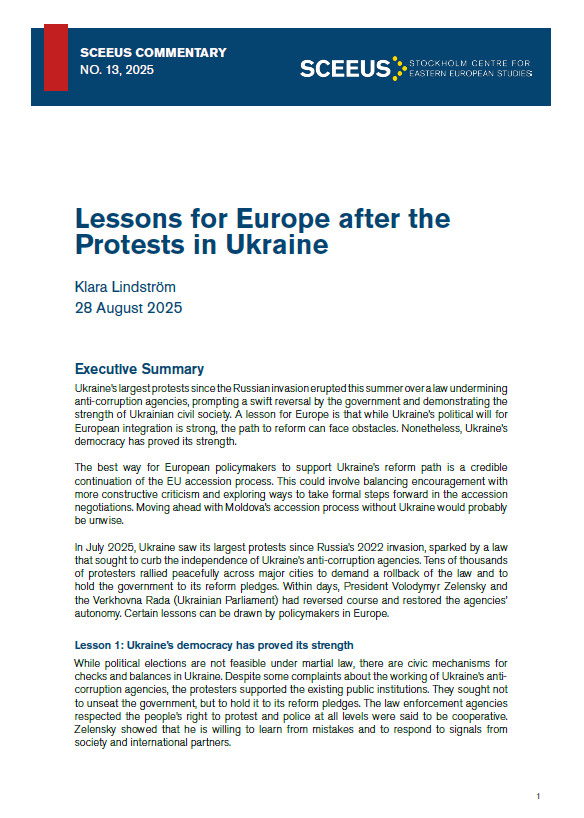SCEEUS Commentary No. 14
Executive Summary
Ukraine’s largest protests since the Russian invasion erupted this summer over a law undermining anti-corruption agencies, prompting a swift reversal by the government and demonstrating the strength of Ukrainian civil society. A lesson for Europe is that while Ukraine’s political will for European integration is strong, the path to reform can face obstacles. Nonetheless, Ukraine’s democracy has proved its strength.
The best way for European policymakers to support Ukraine’s reform path is a credible continuation of the EU accession process. This could involve balancing encouragement with more constructive criticism and exploring ways to take formal steps forward in the accession negotiations. Moving ahead with Moldova’s accession process without Ukraine would probably be unwise.
In July 2025, Ukraine saw its largest protests since Russia’s 2022 invasion, sparked by a law that sought to curb the independence of Ukraine’s anti-corruption agencies. Tens of thousands of protesters rallied peacefully across major cities to demand a rollback of the law and to hold the government to its reform pledges. Within days, President Volodymyr Zelensky and the Verkhovna Rada (Ukrainian Parliament) had reversed course and restored the agencies’ autonomy. Certain lessons can be drawn by policymakers in Europe.
Lesson 1: Ukraine’s democracy has proved its strength
While political elections are not feasible under martial law, there are civic mechanisms for checks and balances in Ukraine. Despite some complaints about the working of Ukraine’s anti-corruption agencies, the protesters supported the existing public institutions. They sought not to unseat the government, but to hold it to its reform pledges. The law enforcement agencies respected the people’s right to protest and police at all levels were said to be cooperative. Zelensky showed that he is willing to learn from mistakes and to respond to signals from society and international partners.
Lesson 2: Implementation of reform can face obstacles
The actions of the Ukrainian Presidential Office (UPO) and their sequencing suggest efforts to consolidate power in the face of a prolonged war. The measures were taken against the backdrop of investigations into business leaders and politicians considered close to the UPO. Zelensky faces the challenge of leading a country at war and managing a government that still lacks unity on European integration, and resistance among some members of the Verkhovna Rada in particular. Further conflicts of interest cannot be ruled out, especially if the EU accession process stagnates. Nonetheless, the will of the Ukrainian people to ensure the country’s democratic and European future is the best guarantee of continued reform.
Lesson 3: Constructive criticism matters
European leaders have been reluctant to criticise the Ukrainian government, given the risk that such criticism could play into the hands of Russia. However, this summer’s events demonstrate how clear messaging from European stakeholders, both in public and behind closed doors, can have a real impact. This might embolden EU policymakers to issue constructive criticism, maintain pressure for reforms (not least to fill the gap left by the United States) and uphold conditionality under the Ukraine Facility Programme. Such “tough love” could strengthen domestic leverage for reform and benefit Ukraine’s European integration in the long run.
Lesson 4: This is only the beginning
While the independence of Ukraine’s anti-corruption bodies was restored, a parallel weakening of the rule of law was not corrected. There continues to be a shift to a centralisation of legal power around the politically appointed Prosecutor General. A key question is whether Ukrainian political elites are ready to sacrifice their informal concentration of power to achieve the long-term target of EU accession. That said, Ukraine continues to meet the conditions for a first cluster opening, the next formal step in the EU accession process.
Recommendations for European policymakers
- Do not fear making criticisms. The EU has the most leverage to demand painful reforms now and should not turn a blind eye to potential mistakes. If a similar situation arises in the future, a specific, clear, rapid and categorical position will be needed from the European Commission. The form and tone of potential criticism would have to be carefully calibrated, and ideally conveyed with one voice through a messenger with access to the top. Pressure on the Verkhovna Rada can be maintained by engaging directly with Ukrainian parliamentarians and political elites.
- Prevent stagnation in Ukraine’s EU accession process. Political blockages risk undermining the EU’s credibility and leverage, reducing the political will for European integration in Ukraine and slowing down reforms. Like-minded EU member states could use their joint financial leverage to put pressure on member states that block a first cluster opening. Creative diplomatic channels for further political pressure, including through the United States, could be explored. Ensuring the success of Ukraine’s EU accession process could be framed as a step towards Europe taking responsibility for Ukraine’s – and therefore its own – security.
- Do not decouple Moldova’s EU accession from that of Ukraine. At this point, when domestic leverage for reform in Ukraine and renewed trust between Ukrainian and European counterparts are most needed, it would likely be unwise to open the first cluster for Moldova alone. Mistakes can happen, but the most important thing is that Ukraine got back on the right track and demonstrated its willingness to continue with reforms.




Resilience and vulnerability: Impressions from a freezing Ukraine